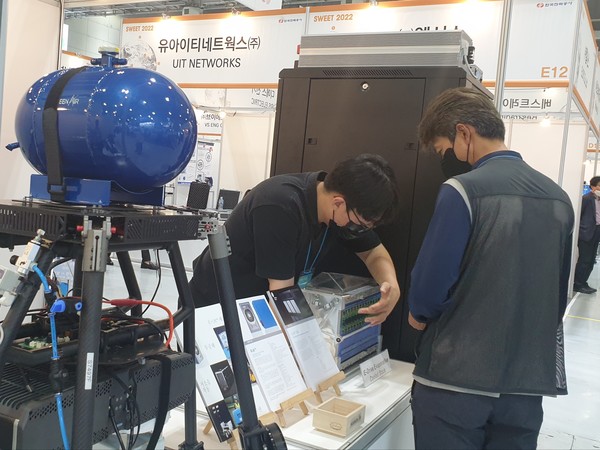Hogreen Air, the Sole Hydrogen Company in the Region, Featured in Guinness Book
Page info
At the "SWEET 2022 (Solar, Wind & Earth Energy Trade Fair 2022)," an integrated energy exhibition leading the way in renewable energy and emerging energy industries, companies presented their technologies, offering insights into the direction South Korea's energy industry needs to take. With the "H-way Hydrogen Road" promised as part of Gwangju City Mayor Kang Ki-jung's pledge, companies venturing into the hydrogen industry attracted attention.
The domestic hydrogen industry officially started in January 2019, coinciding with President Moon Jae-in's announcement of the "Hydrogen Economy Activation Roadmap." The government aimed to establish an industrial ecosystem leading hydrogen economy through two main axes: "hydrogen cars" and "hydrogen fuel cells."
Targets included expanding the cumulative production of hydrogen cars from 2,000 units in 2018 to 6.2 million units (2.9 million domestic, 3.3 million export) by 2040. Additionally, goals were set for the supply of 80,000 hydrogen taxis, 40,000 hydrogen buses, and 30,000 hydrogen trucks. To support this, hydrogen refueling stations were to increase from 14 in 2018 to 310 by 2022 and 1,200 by 2040.
Furthermore, the plan involved integrating hydrogen with power fuel cells to achieve 15 gigawatts of production by 2040, aiming for industrialization and export. This move symbolized supplying these fuel cells to small-scale residential areas and buildings, contributing to the creation of eco-friendly cities with zero carbon dioxide emissions.
The government also envisioned transforming the current gas storage method into a liquid form, establishing a nationwide pipeline network, and inducing price stabilization. The pledge aimed to halve the current price per kilogram, which stands at around 8,200 won in Gwangju.
However, the hydrogen industry still faces challenges. Infrastructure for easily refueling hydrogen and comfortably traveling across the country using hydrogen cars has not been fully established. As of July, the total number of operational hydrogen refueling stations nationwide is only 109, about a third of the target of 310 set for this year. Unlike gas stations and LPG charging stations, finding a hydrogen refueling station that operates 24/7 is difficult. Currently, the Ulsan Gyeongdong Hydrogen Refueling Station is the only one.
Despite these challenges, there are companies in Gwangju working hard on hydrogen energy development in response to global environmental issues. Although Gwangju has not even established a gas hydrogen production facility yet, Hogreen Air, located in Buk-gu, is dedicated to the development of "liquid hydrogen" and "hydrogen fuel cells." Hogreen Air recently signed a production contract with Intelligent Energy, a UK-based hydrogen fuel cell production and development company. It also participated as the only small and medium-sized enterprise in the 1st Korea-UK Hydrogen Industry Cooperation Seminar held last week.
Hong Seong-ho, CEO of Hogreen Air, who attended the event, emphasized, "Our company has much to offer in terms of achieving the direction of carbon neutrality." He highlighted the fuel cell industry as the core of the hydrogen industry.
He stated, "A fuel cell factory will soon be constructed in Daecheon Industrial Complex," adding, "The future of green energy depends on how much smaller-sized cells we can develop in that factory." Furthermore, he expressed his hope that if fuel cells for buildings become smaller, users can easily access them, and they can be distributed to facilities such as hospitals, schools, and important infrastructure. He emphasized that this not only provides warm water using gas and water but also produces electricity.
He shared, "Our company's technology was used when Boeing and Airbus produced hydrogen planes," expressing his desire to utilize hydrogen fuel cells in various ways, including drones, forklifts, vacuum cleaners, golf carts, and more.
He added, "Liquid hydrogen can reduce volume by about 800 times compared to gaseous hydrogen," mentioning that this technology is successful in only about two places in South Korea and around twenty globally. He expressed his determination to succeed in this technology to contribute to the spread of green energy.
He concluded, "Our company's technology enabled a liquid hydrogen drone to fly for more than 12 hours, earning a place in the Guinness Book." He acknowledged the challenges of being a small and medium-sized enterprise in a business dominated by large corporations but emphasized the need for local governments and government support, as the fuel cell industry is crucial to the hydrogen industry.
Meanwhile, the Ministry of SMEs and Startups is striving to achieve 100% localization of hydrogen car parts and reduce prices through the "Hydrogen Car Component Technology Development Roadmap." It also aims to improve system reliability and optimization technology.
